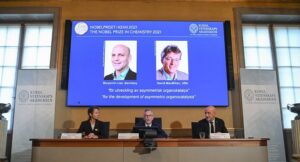 Germany’s Benjamin List and David MacMillan of the United States on Wednesday won the Nobel Prize in Chemistry for their development of a precise new tool for molecular construction, the jury said.
Germany’s Benjamin List and David MacMillan of the United States on Wednesday won the Nobel Prize in Chemistry for their development of a precise new tool for molecular construction, the jury said.
The duo was awarded “for their development of a precise new tool for molecular construction: organocatalysis. This has had a great impact on pharmaceutical research, and has made chemistry greener,” the Nobel Committee said.
List and MacMillan, both 53, will share the 10-million-kronor ($1.1-million, one-million-euro) prize.
MacMillan is a professor at Princeton University in the US, while List is a director at the Max Planck Institute in Germany.
“Many research areas and industries are dependent on chemists’ ability to construct molecules that can form elastic and durable materials, store energy in batteries or inhibit the progression of disease,” the Nobel Committee at the Royal Swedish Academy of Sciences said in a statement.
“This work requires catalysts, which are substances that control and accelerate chemical reactions, without becoming part of the final product,” it added, noting that prior to the work of the laureates, scientists believed there were only two types of catalysts, metals and enzymes.
In 2000, the researchers, working independently of each other, developed a third type, called “asymmetric organocatalysis”, which relies on small organic molecules.

Nguema Wins Gabon Presidential Election With Overwhelming Majority
Algeria Orders Expulsion Of French Diplomats, Raising Tensions With France
Suspected United States Strikes Kill Six In Yemen — Houthis
Trump’s Massive Tariffs Take Effect, Deepening Global Trade War